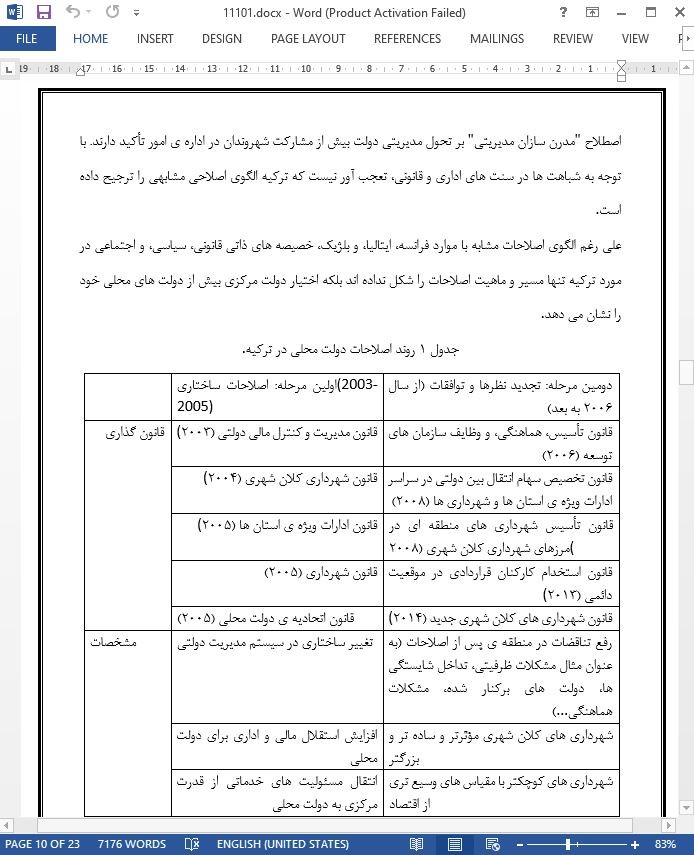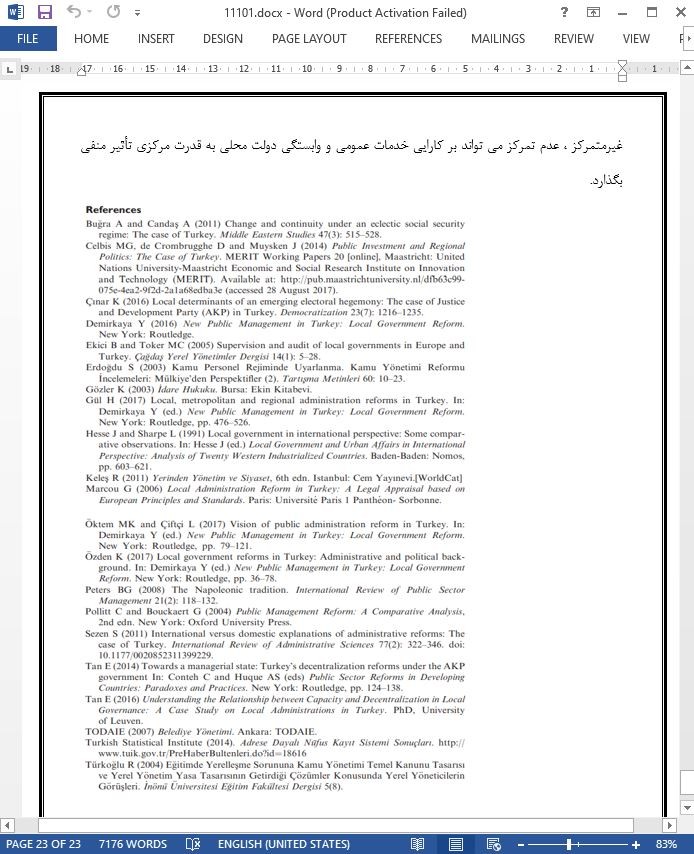
کجا می روی؟ دولت محلی در ترکیه پس از اصلاحات مدیریت دولتی
چکیده
در دهه ۲۰۰۰، کشور ترکیه سیستم مدیریت دولتی خود را در راستای اصول مدیریت دولتی جدید به سوی بک سیستم غیر متمرکزتری اصلاح کرده است. اگرچه هدف اولیه ی این فرآیند اصلاحی آماده سازی برای رسیدن به سیستم مدیریت دولتی غیرمتمرکز و کارآمدتری می باشد، داده های تجربی و آمار رسمی این شبهه را ایجاد می کنند که آیا این نتیجه تاکنون حاصل شده است یا خیر. با تجزیه و تحلیل قوانین دولت محلی، اختیار دولت مرکزی در حکومت های محلی، و تغییرات در وضعیت دولت محلی در حکومت دولتی، این مقاله تکامل سیستم دولت محلی در ترکیه در طول دولت حزب عدالت و توسعه را ارائه می دهد.
مقدمه
ترکیه، یک دولت به شدت متمرکز، قوانین اصلاحی مختلفی درباره ی اداره ی محلی در سال های 2003-2005 تصویب کرده است. عملکردها، نقش ها، و مسئولیت های دولت های محلی با قانون جدید بیشتر شده اند. خدمات دولتی، که به جهت انجام شدن توسط دولت مرکزی مورد استفاده قرار گرفتند، در بهداشت، گردشگری و فرهنگ، جنگل داری و محیط زیست، کشاورزی و امور روستایی، مراقبت اجتماعی و مراقبت از کودک، جوانان و ورزش، صنعت و امور عمومی به دولت محلی محول شده اند. استقلال اداری و مالی دولت محلی به رسمیت شناخته شده است و دولت محلی اختیار فزاینده ای در فعالیت های اقتصادی و استقراض مالی بدست آورده است.
نتیجه گیری
ترکیه اصلاحات مدیریت دولتی گسترده ای را در دهه ی 2000 تجربه کرده است و سیستم مدیریت دولتی خود را با توجه به اصول مدیریت دولتی جدید بازسازی کرد. یک ویژگی قابل شناسایی از روند اصلاحات، تمرکز زدایی قدرت مرکزی به سوی دولت محلی بود. تمرکز زدایی قدرت مرکزی نه تنها آغاز توانمند سازی دولت محلی بود بلکه آغاز افزایش بهره وری و اثربخشی ارائه ی عمومی نیز بود. برای ارزیابی تأثیر اصلاحات دولت محلی، این مقاله بر تغییرات در اختیار دولت مرکزی در حکومت محلی و در موقعیت دولت محلی در مقابل دولت مرکزی در حکومت دولتی متمرکز پرداخته است. یافته ها نشان می دهند که علی رغم افزایش استقلال اداری و مالی دولت محلی، دولت مرکزی هنوز موقعیت مؤثر خود در حکومت محلی را حفظ می کند. 10 سال پس از اصلاحات تمرکز زدایی اولیه، ارزیابی کلی از دولت محلی نشان دهنده ی بهبود قابل توجهی در نقش دولت محلی در حکومت دولتی در مقایسه با دوره ی پیش از اصلاحات نمی باشد.
Abstract
In the 2000s, Turkey has reformed its public administration system in line with New Public Management (NPM) principles towards a more decentralized system. Although the initial aim of the reform process is set to achieve a decentralized and more efficient public management system, the empirical data and official statistics cast doubt on whether this outcome will ever be achieved. Analyzing local government legislation, the discretion of central government in local governance, and the changes in the status of local government in public governance, the article presents the evolution of the local government system in Turkey during the Justice and Development Party government.
Introduction
Turkey, a profoundly centralized state, has enacted various local administration reform acts in the years 2003–05. The functions, roles, and responsibilities of local governments have been extended with new legislation. Public services, which used to be carried out by the central government, in health, tourism and culture, forest and environment, agriculture and village affairs, social care and child protection, youth and sports, industry and public works have been devolved to local government. The administrative and financial autonomy of the local government is recognized, and local government has obtained increasing discretion in economic activities and fiscal borrowing.
Conclusion
Turkey has experienced an extensive public management reform in the 2000s and restructured its public administration system according to New Public Management principles. An identifying characteristic of the reform process was decentralizing the central authority towards local government. The decentralization of the central authority was not only initiated to empower the local government but also to increase the efficiency and effectiveness of public service delivery. To assess the impact of local government reforms, the article focused on the changes in the central government’s discretion in local governance and in local government’s position vis-a`-vis the central government in public governance. The findings point out that despite the increasing administrative and financial autonomy of the local government, the central government still upholds its influential position in local governance. Ten years after the initial decentralization reforms, the overall assessment of local government does not indicate a significant improvement in the local government’s role in public governance in comparison to the pre-reform period.
چکیده
نکاتی برای کارورزان
مقدمه
مرور اجمالی بر دولت محلی ترکیه
اصلاح مدیریت دولتی در طول دولت حزب عدالت و توسعه
اختیار دولت مرکزی بیش از حکومت محلی پس از روند اصلاحات
اختیار اداری
اختیار مالی
اختیار سیاسی
روندها در آمار دولت محلی پس از اصلاحات مدیریت دولتی
نتیجه گیری
Abstract
Points for practitioners
Introduction
An overview of Turkish local government
Public management reform during the AKP government
The discretion of central government over local governance following the reform process
Administrative discretion
Financial discretion
Political discretion
Trends in local government statistics after public management reforms
Conclusion
- اصل مقاله انگلیسی با فرمت ورد (word) با قابلیت ویرایش
- ترجمه فارسی مقاله با فرمت ورد (word) با قابلیت ویرایش، بدون آرم سایت ای ترجمه
- ترجمه فارسی مقاله با فرمت pdf، بدون آرم سایت ای ترجمه



